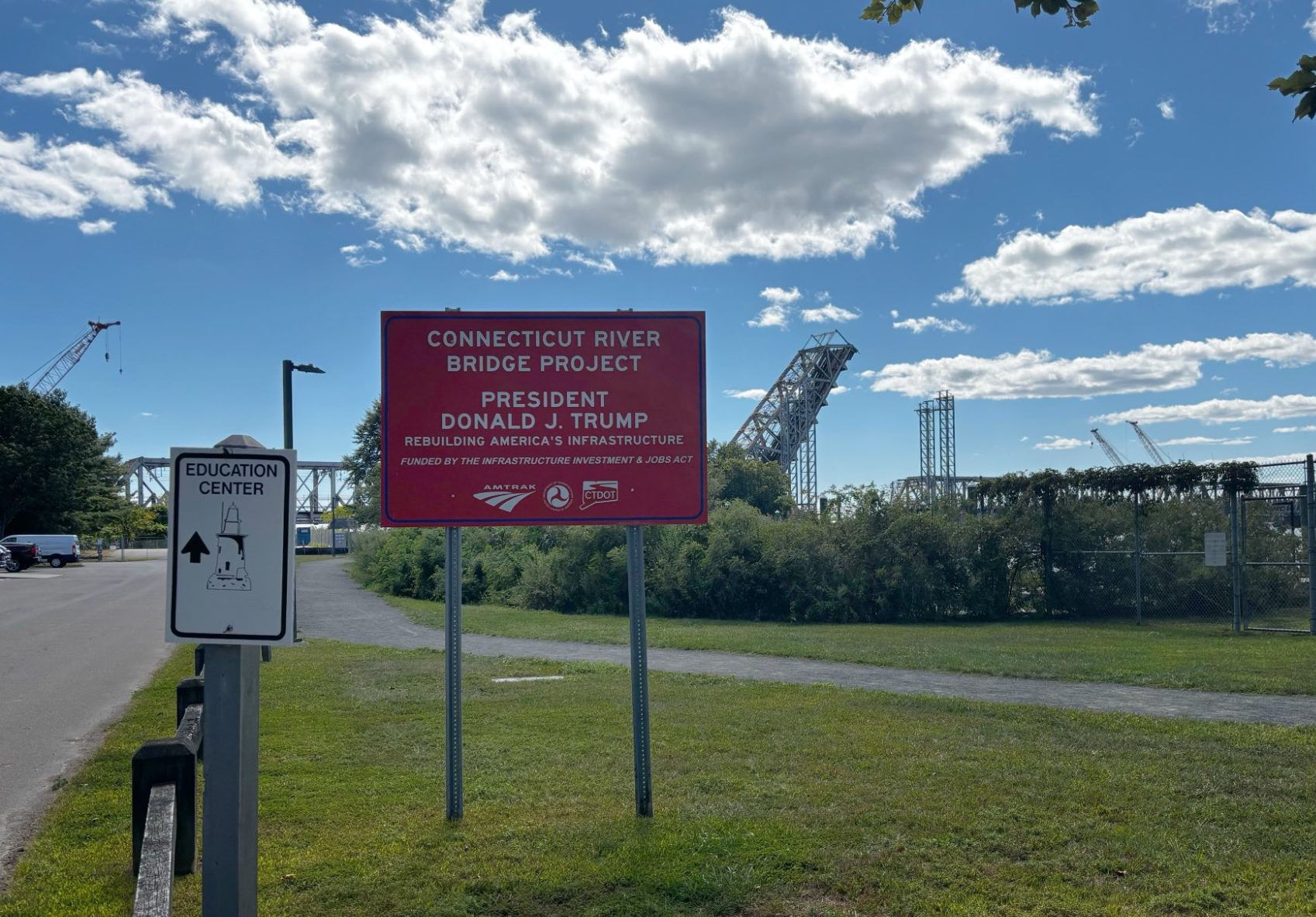Funding anxiety hits Connecticut transportation projects like a train
As long overdue infrastructure projects continue construction, changes in federal funding create uncertainty in New Haven and across Connecticut.

Eric Song, Contributing Photographer
OLD LYME — Beside a century-old bridge in Old Lyme, the steel beams of a new railroad river crossing under construction stretch from the eastern bank of the Connecticut River, a critical structure along America’s busiest rail corridor.
A blue sign that once boasted the accomplishments of “President Joe Biden’s Bipartisan Infrastructure Law” has been taken down.
A red one stands in its place: “President Donald J. Trump, rebuilding America’s infrastructure.”
The new sign, positioned in front of the new Connecticut River Bridge Project set to be completed by 2031, is a potent symbol of the new administration’s changes to federal infrastructure funding.
Since Trump took office in January, New Haven has faced threats to tens of millions in federal dollars, including a $20 million Community Change Grant for cycling infrastructure and a $9.5 million grant for geothermal heating at Union Station. A federal judge has since ordered the federal government to reinstate the grants issued to the city.
Meanwhile, funding for Amtrak operations and infrastructure improvements along the Northeast Corridor has been slashed, and Yale has paused 10 infrastructure projects, including the long-planned pedestrianization of High Street, due to uncertainty about federal funding.
While some projects have faced setbacks, others — including the city’s $25 million rapid transit project for buses — continue to receive funding, albeit with increasing uncertainty.
Alexandra Daum, an administrator who manages Yale’s relationship with New Haven, told a June 3 Chamber of Commerce meeting that the University made the decision to halt new construction because Yale could potentially lose a sixth to a tenth of its federal funding. Projects already under construction would continue to progress, Daum said at the meeting.
U.S. Department of Transportation Secretary Sean Duffy made his agenda clear in a memo released on Jan. 29, which stated that the Department of Transportation would “give preference to communities with marriage and birth rates higher than the national average,” “prohibit recipients of DOT funding from imposing vaccine and mask mandates,” and require recipients to comply with federal immigration enforcement and other priorities as specified by the White House.
Connecticut ranks 44th of 50 states in fertility rate, and New Haven was listed as a sanctuary city by the Department of Homeland Security. The transportation department has not responded to repeated inquiries from the News about its plans to fund New Haven’s infrastructure.
Connecticut Attorney General William Tong pushed back against Duffy’s policy, joining a lawsuit with 19 other states arguing that immigration policy cannot dictate transportation funding.
“Immigration enforcement is a federal role. Plain and simple. You cannot coerce states into doing the federal government’s job by stealing our disaster relief and transportation funding. This is dumb and dangerous, and we’re fighting back,” Tong said in a press release about the suit.
In June, a judge ruled against Duffy’s policy, finding that the states have sufficiently demonstrated that the new policy would subject them to “irreparable and continuing harm.” Duffy responded to the ruling on X — formerly Twitter — calling the decision “judicial activism, pure and simple” and declared that he would “keep fighting in the courts.”
When asked about how changes in federal funding priorities have affected operations, Connecticut Department of Transportation spokesperson Eva Zymaris reiterated that the state was “committed to being good stewards of federal funds,” and that none of the 600 projects currently underway would have been possible without “federal partnership and sustained federal funding” for CTDOT.
A different track
Every Amtrak route except the Northeast Corridor that serves New Haven can expect increases in funding in the next fiscal year.
Amtrak, whose CEO resigned in March after the Trump administration threatened to privatize the rail network, requested $850 million in Northeast Corridor funding for fiscal year 2026, a significant cut from the $1.14 billion allocated in the previous budget.
The Connecticut state budget also includes changes to rail funding. On Monday, Metro North and CT Rail fares increased 5 percent and are set to increase 5 percent more in July 2026.
CTDOT said in a press release last July that the increases are necessary to address a “funding gap to support current rail services.”
Aaron Donovan, a spokesperson for the Metropolitan Transportation Authority, told the News that CTDOT is solely responsible for changes on the New Haven Line, including capital investment and fare increases.
Jason Abrams, a spokesperson for Amtrak, said the $850 million amount is “the correct amount that we need to support increased investment” in the Northeast Corridor. According to Abrams, the Trump administration has provided the amount Amtrak requested.
Despite the uncertainty around federal funding, projects across Connecticut that were funded by the 2021 Infrastructure Investment and Jobs Act have not been affected.
In Old Lyme, the new Connecticut River Bridge is set to be finished in 2031. For now, the name “Donald J. Trump” looms large.
The current Connecticut River Bridge was finished in 1907.
Interested in getting more news about New Haven? Join our newsletter!







